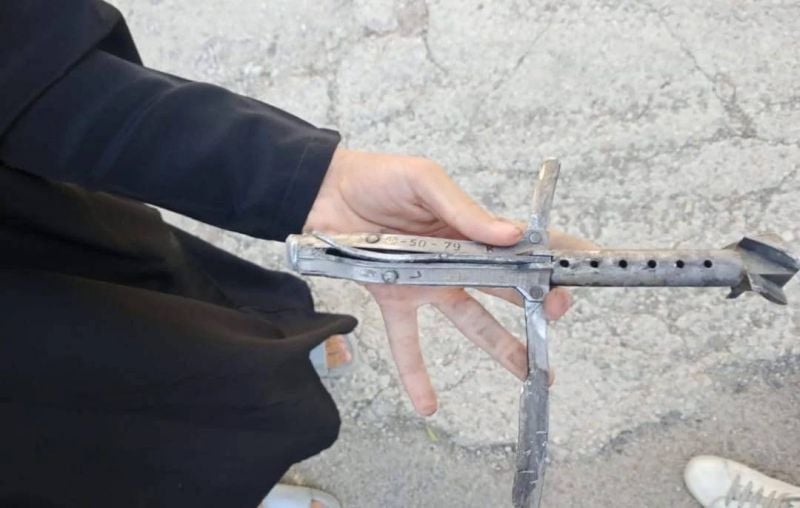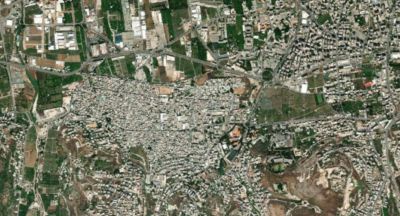
A fragment of a shell was found in the Taamir district, south of Saida. (Credit: Mountasser al-Abdallah/L'Orient Today)
BEIRUT — Fighting resumed Saturday morning between Fatah and Islamist groups in the Ain al-Hilweh Palestinian refugee camp near Saida, leaving at least four people dead and 15 injured, L'Orient Today's correspondent in the area reported.
The ceasefire agreement reached Friday evening, which was generally respected throughout the night, was broke at around 10 a.m., with clashes regaining intensity, our correspondent reported, citing Palestinian eyewitness sources in the camp.
Heavy machine-gun fire and shells were heard in a short video filmed by a resident of Sayroubiyeh, on the outskirts of Saida.
Fatah special forces were also reported to be in action.
Ambulances began arriving to the scene, but kept distance from the epicenter of the fighting, to transport the injured to hospitals.
In total, this morning's clashes left two individuals dead and 15 wounded.
In Ghazieh, a village near Saida, one civilian was killed by a stray bullet and two people were wounded. One Palestinian and another militant in Ain al-Hilweh were also killed, and eight others were injured in the camp. In Saida's Hisbeh neighborhood, one man was injured.
Nine of those wounded were transported to al-Hamshari Hospital where they are being treated. Three of the injured were transported to al-Ra’e Hospital and three others were treated in the field.
Meanwhile, a bombshell landed on a ceramic factory in the Arab roundabout in Saida, destroying some of its equipment.
Stray bullets wounded an employee at the Osseiran Hospital in Saida, and a second person near the waste factory in the city.
As in the previous day's fighting, the surrounding district of Taamir, south of Saida, was particularly exposed.
After calming in the afternoon, the clashes intensified by evening, spreading to the neighborhoods of al-Tiri, al-Ras al-Ahmar, al-Safsaf, and the barracks along al-Fawqani street.
The Lebanese Army enforced security measures and diverted traffic to the seaside route in response. In a statement issued Saturday, the army urged that the warring groups adhere to the cease fire.
The Army stated "it is working to take appropriate measures and make the necessary communications to stop these clashes that endanger the lives of innocent citizens."
The Army also called on local residents "to exercise caution in the areas surrounding the camp, to avoid the sites of clashes, and adhere to the measures taken by the military units deployed in the region to preserve their safety.”
Speaking to L'Orient Today, a source from the Democratic Front for the Liberation of Palestine (DFLP) said certain Palestinian factions are communicating with the Fatah, Jund el-Cham and Shabab al-Moslem fighters, in an effort to conclude another ceasefire. The initiative is being supported by the Palestinian ambassador to Lebanon Ashraf Dabbour, parliament head Nabih Berri, and notables from Saida.
The ceasefire is expected to include the withdrawal of Islamist gunmen from occupied UNRWA schools, and the handover of eight suspects to the Lebanese authorities, the DFLP source added.
The press office of Lebanon's caretaker Prime Minister Najib Mikati stated Saturday that the premier spoke to Palestinian president Mahmoud Abbas over the phone about the issue.
“What is taking place does not serve the Palestinian cause at all and is a serious offence to the Lebanese state [and the city of Saida],” Mikati told Abbas.
In a statement made on X (previously Twitter) Mikati emphasized "the priority of ending military operations and cooperating with Lebanese security forces to address tensions.”
Displaced persons
According to a local source who requested anonymity, some 300 displaced people from the Ain al-Hilweh camp have taken refuge in Saida's municipality building. Local scouts have reportedly come to provide moral and logistic support to the displaced. Others took refuge in some of the city's mosques and abandoned buildings, or with relatives. Local and international aid organizations have said that the total number of displaced persons currently stands at around 2,000.
The same aid organizations, along with UNRWA, are working together to respond to the escalating situation. The Lebanese Red Cross is also said to be setting up a camp not far from the courthouse, capable of housing around 100 families.
According to the same local source, UNRWA expects an additional 10,000 to 20,000 displaced persons to leave the camp in the coming days.
"All the citizens I've been able to speak to feel that the situation is much worse than when the first fighting broke out last month," she stressed.
UNRWA schools and some public educational establishments could be requisitioned to rehouse the displaced, while humanitarian actors on the ground expect the start of the school year in these establishments, which is due to take place at the beginning of October, will be postponed in view of the worsening situation in the camp.
'Anxiety-provoking' and 'normal' at the same time
The round of fighting that broke out Thursday evening injured at least 20 people and displaced hundreds, several medical sources in the camp said earlier that day.
Lara, 29, an expat living in Canada, came to visit her parents in central Saida. She detailed visiting the fruit and vegetable market the city's Hisbeh neighborhood on Saturday morning when shots were heard.
"People around us immediately exclaimed: 'It's happening again, it's happening again,'" Lara said.
"From our apartment we can also hear the shooting, and from the balcony we have a view of a house damaged by an explosion early this morning, according to my parents, because I didn't hear it personally," she explained.
Lara described the situation as "alarming and anxiety-provoking," but at the same time "normal."
"It's part of the lot [of living here]," she sighed.
In Saida, the atmosphere is calm today, she said. "There are no instructions, life goes on almost as if nothing had happened."
According to various sources within the camp, the violence continued because the Islamist groups involved in the fighting are still trying to prevent the joint security forces from arresting the eight people accused of killing Abu Ashraf al-Armoush.
Armoush, the head of security at the Fatah-affiliated camp, was killed at the end of July along with his four bodyguards. Armoush's murder was a reprisal for the murder one day prior, of an Islamist group leader, which itself was a reaction to the assassination on March 1 of a young Fatah member.
At the end of July, clashes rocked the camp and claimed the lives of at least 13 people.
